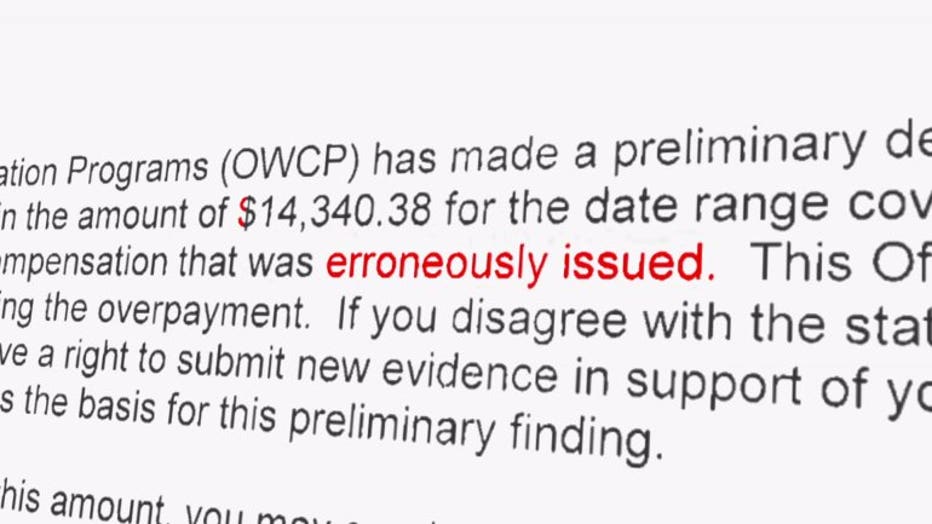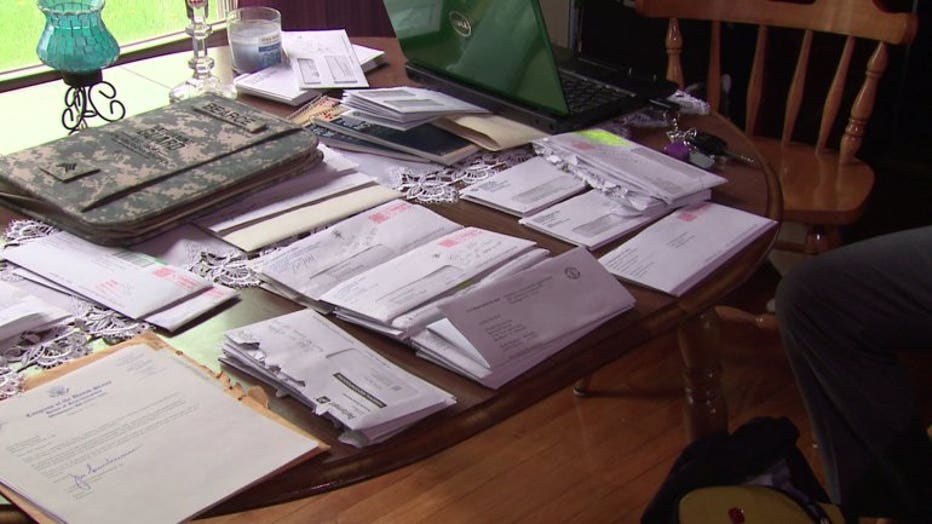"There's no way I can fight this myself:" Combat vet battling Uncle Sam over government error
JEFFERSON — The federal government made a big mistake and now, a disabled Wisconsin veteran is paying the price. An error in the federal Workers' Compensation Program could force the father of four to sell his home.
Ron Bearce did nothing wrong. The letters from the government say so, but that has not stopped Uncle Sam from treating this decorated combat veteran like a deadbeat.
Nine years ago, Bearce was in the Army -- fighting for his country, but today, he is fighting chronic back pain.
He was once a strapping young soldier. Now, he needs help just to start the lawnmower.
"Causes a lot of stress on our marriage," Bearce said.
Bearce lives with his wife and four children in Jefferson, and mowing the lawn is about the most physical activity he gets these days. It's a marked change from the 23 years he spent serving in the Wisconsin National Guard, including a pair of tours in Iraq.

Bearce (center), with members of his unit during one of two tours in Iraq.
"Me and my bros, we still get together every once in awhile," Bearce said.
It was a tough day in 2013 when word came that the National Guard was letting him go.
"Just like, wow. I couldn't believe it," Bearce said.
Bearce was a "dual status" technician at the Milwaukee Armory. That meant his full-time civilian job depended on him being a member of the military. In other words, losing his position in the National Guard also cost him his regular job.
"Bam, slapped in the face again," Bearce said.

Ron Bearce
The notice that he was being "non-continued" for service came six months ahead of his actual termination date. So Bearce kept working. With one month left on the job, he picked up a 60-pound military Hawker battery and injured his back.
"Boom. It popped. That was it," he said.
He knows the timing looks bad.
"That's definitely the feeling I was getting. It really felt like, 'he did this on purpose. He knows the system well enough to fake this,'" Bearce said.

Ron Bearce
X-rays and MRIs would eventually show his injury was legit. He had a herniated disc that required surgery and left him with a medicine cabinet loaded with pills, from OxyContin to morphine.
"Just to like, be able to get through the day," Bearce said.

Bearce's 'letter in the mail' now includes collection agency notices.
Still, the real back-breaker is what happened after he was discharged.
"My credit is so down the drain now," he said.
Bearce applied for workers' compensation. For the first several months, no money was coming. Finally, in May 2014, a check arrived for more than $11,000, covering four months of lost wages. Then another check for $3,000.
"And I was like, thank God, because bills, they were stackin' up," he said.
He used the money to pay those bills -- and then, the government dropped a bomb.
''I got this letter in the mail," Bearce recalled. "'Oh, we're sorry. We made a mistake.'"

The Office of Workers' Compensation Programs informed him they had erroneously sent more than $14,000. Even though it was not his fault, the government wanted the money back.
"And I was like 'what?'" he said.

Bearce has kept every letter sent to him by the federal government since his injury.
The feds approved Bearce for disability retirement and agreed to pay 100 percent of his medical bills, but decided he was not entitled to lost wages from January 2014 to May 2014, because he'd already been told his job was ending before he got hurt.
"The fact that he received advanced notice of discharge is irrelevant," Attorney Mitchell Barrock said.
Bearce hired the Brookfield attorney to help fight the government's claim.
"It's a slam dunk," Barrock recalled thinking at the time.
"There is no way we are not gonna win this case," Bearce said.

Ron Bearce
But as the months passed by, Bearce heard nothing.
And Barrock wrote the federal government a letter, and another, and another -- asking for an update.
"I think this absolutely should've received due consideration, and he should've received his benefits. But he didn't," Barrock aid.
It wasn't until two years after the injury that the U.S. Department of Labor finally told Bearce its decision was final. And that's when the federal government started sending collectors to get the money.
"Feel like I've been punched in the stomach and slapped in the face and treated like dirt," Bearce said.
Barrock referred Bearce to a federal workers' compensation specialist in Ohio, who requested a hearing on Bearce's behalf, and then quickly dropped him as a client because he couldn't afford the hefty retainer.
"There's no way I can fight this by myself," he said.

Since then, Bearce has tried every workers' compensation lawyer he can find.
"Private counsel don't usually get involved in military cases," Barrock said.
And since Bearce is no longer in the military, he can't get legal help there either.
"When I was in, they took good care of me and everybody took care of each other, but then when I was out, it was like you're an outsider looking in," he said.
Because the over-payment was not Bearce's fault, the government could waive repayment, but so far has declined to do so.
"How are we going to do this? How are we going to pull this magic rabbit out of the hat?" Bearce said.

Bearce's family home in Jefferson is now up for sale, as garnishments and income tax interceptions have made it harder for him and his wife to make ends meet.
He insists he can't afford to make the payments and has listed the family house for sale. His disability retirement checks are now being garnished. In March, the government confiscated his federal tax refund -- more than $1,100.
"After all the time that I gave my country and gave up as far as myself and my family, I have a very, very bad taste in my mouth for the government," he said.
His former attorney, Mitchell Barrock, said: "I always thought the military is supposed to stand up for the people who stand up for the rest of the country and I just don't see it happening here."
As a decorated combat veteran of the war on terror, it is safe to say Ron Bearce has faced tougher battles.
"This is piddly, but this is what I have to do for survival now. I feel like I've been punched in the stomach and slapped in the face and treated like dirt," Bearce said.
After years of fighting for his country, it is hard to blame him for wondering why his country is now fighting him.

